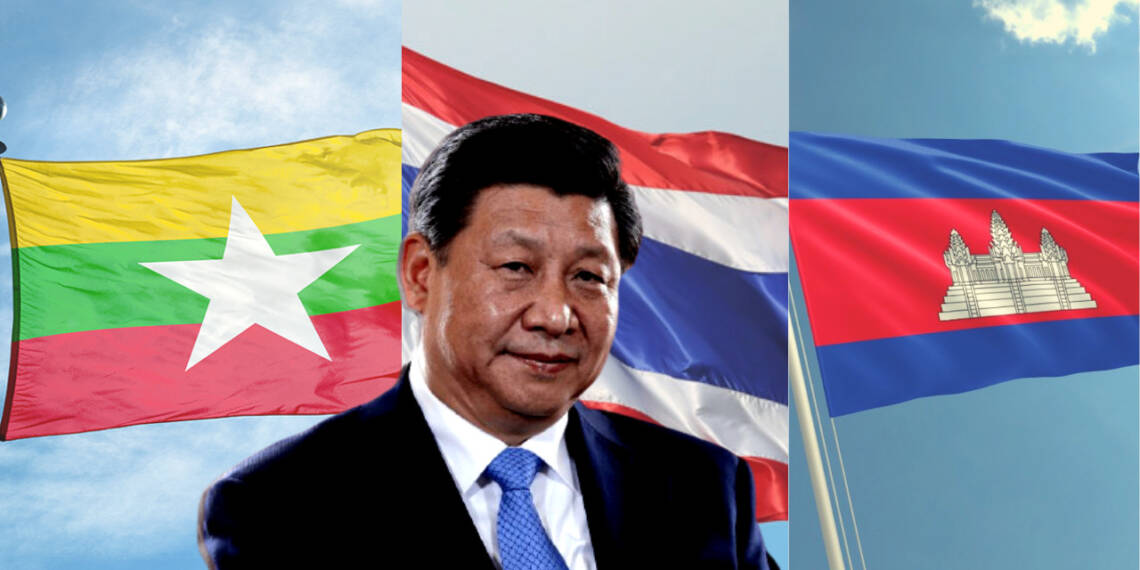Over the past two decades, China has grown too big. Its economy has seen unprecedented and amazing growth. But then the Middle Kingdom hasn’t grown as a noble, responsible power. Rather, the Chinese have grown into a compulsive bully who believes in neocolonialism. And, what do colonial powers do? Well, they take over smaller economies, open up their own plantations and push their crime syndicates into smaller nations. Who would know this better than Southeast Asia, which continues to bear the brunt of the dangerous growth trajectory of the Chinese? An SCMP report gives three examples- Thailand, Myanmar and Cambodia.
As for the Southeast Asian nation of Thailand, the country has remained high on the global tourism radar. But, now the number of Chinese tourists is growing at a breakneck speed on the back of relatively lower travel costs, easy visa arrangements and more frequent flights. However, Chinese tourism isn’t necessarily good news for Thailand.
The bigger issue in Thailand is that now it has to adapt itself to the Chinese language and culture. Road signs, restaurant menus and shop catalogues at popular tourist spots have to be increasingly written in simplified Chinese characters.
Language, however, is not the only issue. China is basically taking over the Thai tourism economy also. Take, for example, China’s so-called zero-dollar tour packages. These packages charge very little upfront with a necessary precondition that tourists should shop in designated tourist locations to make up the difference. This is part of the Chinese yitiaolong (one-stop) tourism industry in Thailand, which involves several Chinese operators setting up shops, hotels, restaurants and other tourist amenities in Thailand.
It is no coincidence that most of the profits from yitiaolong go back to China. This is Beijing’s neocolonialism at the display, as Chinese business interests virtually monopolise Thailand’s tourism economy. The Chinese State, of course, claims that it has nothing to do with the entrenchment of Chinese business interests in Thailand but, we know of at least one instance in 2018 when a tussle between Thai and Chinese media over unruly behaviour by a Chinese business entity led to a tourist boycott by China.
Now, let us move to Myanmar. China is exploiting this Southeast Asian nation for meeting its own corn imports. Myanmar is usually known for extensive paddy cultivation. But of late, things are changing. Demand for meat and meat products like pork is growing in China. Corn, a basic raw material in the meat industry, is grown extensively in the Communist nation itself and it was also a net exporter in this product till 2008.
So, China needs alternatives for procuring corn as animal feed. And it looks at Myanmar for corn production. Corn cultivation has picked up in Myanmar, especially in the Northern parts of the country. The level of corn production in this Southeast Asian nation jumped from 1,200 tonnes in 2011 to 1,600 tonnes in 2012. The level of corn production has kept rising ever since.
But such steep acceleration in corn production has had its own costs in Myanmar. It has caused extensive damage to northern Myanmar’s forests. Satellite data shows a remarkable increase in deforestation in the Shan State of the strategically located country that shares borders with both India and China.
Now, China is simply feeding itself off of Myanmar’s land resources. In the process, Myanmar sustains extensive ecological damage. This is just one of the many examples of how China’s State-backed food chain and consumption patterns can inflict damage on the planet’s ecology.
Lastly, Cambodia continues to bear the brunt of Chinese growth too. Cambodia is one of China’s few remaining allies in Southeast Asia. But Beijing won’t spare it either. China remains concerned about gangster mafias within its own territory. In 2018, China’s State Council even issued a guideline on how to combat gangsters. Even before the nationwide effort was initiated, provincial and local authorities in China were running a campaign against such mafias.
But what happens to the gangsters, who come on the Chinese Communist Party’s radar? Do they languish in Chinese jails? Well, no. Chinese jails are supposed to perform more important functions like incarcerating whistleblowers, protesters, dissenters and freelance journalists. Gangster mafias, on the other hand, were sent to other nations.
Take, for example, Cambodia’s Sihanoukville province. Chinese gangster activities have caused a huge spike in crime rates within the Sihanoukville province. Chinese investments and migration in Cambodia’s casino economy are peaking. Migration of Chinese businesses and Chinese crimes are causing a spike in organised crime and real estate prices. Many Cambodians are themselves migrating out of Sihanoukville.
There is increasing resentment in the Southeast Asian nation of Cambodia against Chinese interests. The Chinese Communist Party (CCP) however, doesn’t seem to care what Cambodians feel about China.
China’s growth is Southeast Asia’s bane. Chinese non-State actors or perhaps even State-backed interests are turning Southeast Asia into a living hell.








